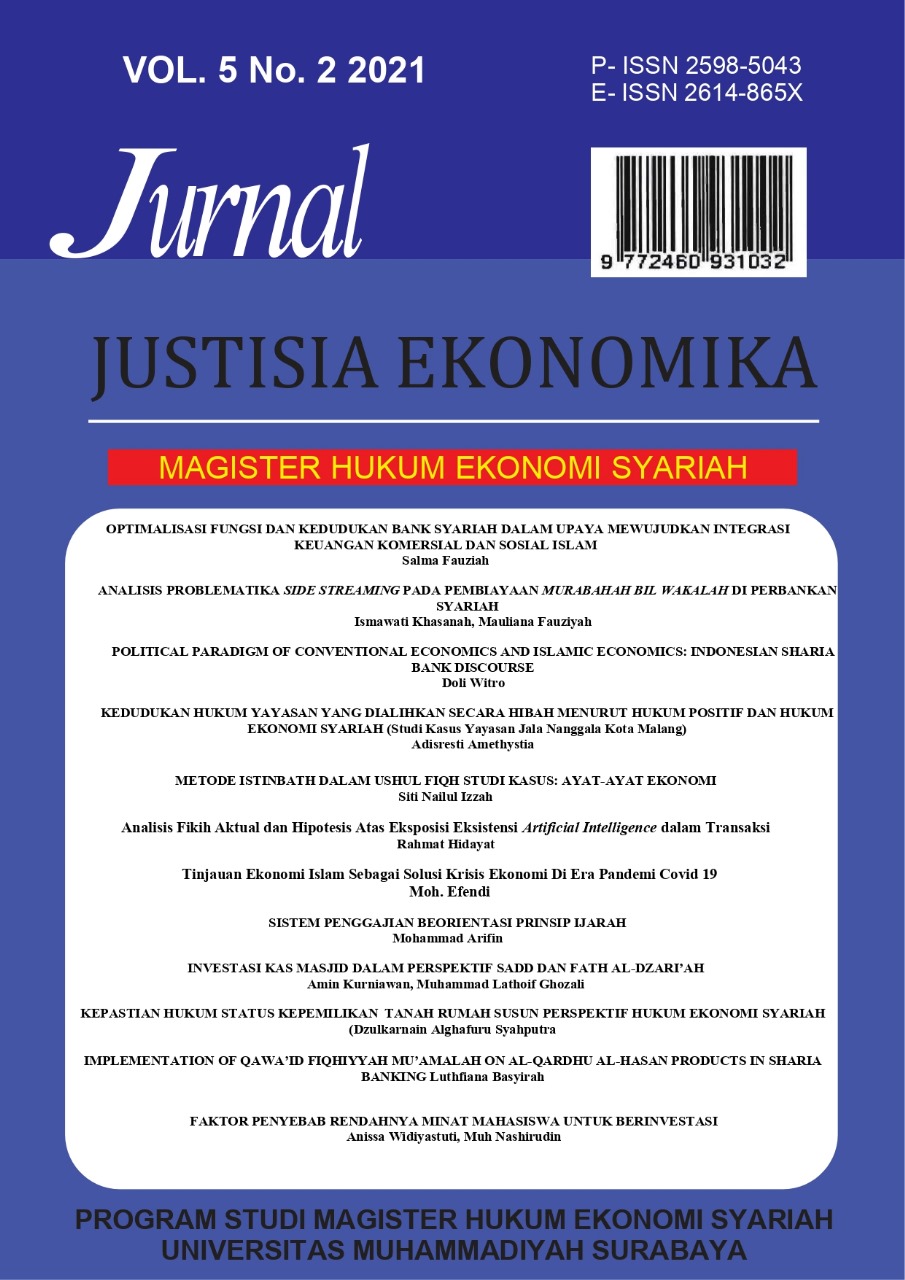Analisis Fikih Aktual dan Hipotesis Atas Eksposisi Eksistensi Artificial Intelligence dalam Transaksi
DOI:
https://doi.org/10.30651/justeko.v5i2.10340Abstrak
This study aims to determine Islamic law on AI (artificial intelligence) in transactions. In this era, AI has entered into various sectors of commerce. Many large companies have used AI in various functions and roles. So it is necessary to study the legal impact of AI in transaction. This research uses a normative method with a conceptual approach. In transactions, weak AI has occupied at least three positions out of four possible positions, as objects, tools and limited agent. Meanwhile, strong AI, which occupies a position as an independent entity, does not yet exist at this time. At least three positions can be measured actually and one position can be measured hypothetically. Weak AI as objects, tools and limited agent is punished by rules related to its position. But in general, the blame for the AI in these three positions lies with the provider and not the AI itself. Meanwhile, AI as an independent entity, if it is analogous to the general rules of transactions, then all the consequences of his wrongful actions will be charged to him. Because the error is the result of the ability of think independently. The punishment that can be applied is punishment within the scope of ta'zir that is adjusted to government regulations as well as scientific research on the limits of AI intelligence.
Referensi
Agrawal, Ajay. Gans, Joshua. Goldfarb, Avi. 2019, The Economics of Artificial Intelligence: An Agenda, Chicago, The Univesity of Chicago Press.
Bukalapak.com Tbk. 2021, Prospektus Awal, Jakarta, t.tp.
Chojecki, Przemek. 2020, Artificial Intelligence Business: How You Can Profit from AI, Birmingham, Packt Publishing.
Chopra, Rajiv. 2012, Artificial Intelligence, A Practical Approach, India: S. Chand Publishing.
Cohen, Paul R. 2005, 'If Not Turing's Test, Then What?" AI Magazine, Vol. 26 No. 4. https://doi.org/10.1609/aimag.v26i4.1849
Dahria, Muhammad. 2008, “Kecerdasan Buatan (Artificial Intelligence)†Jurnal Saintikom, Vol. 5, No. 2.
Djulaeka., Rahayu, Devi. 2019, Buku Ajar Metode Penelitian Hukum, Surabaya, Scofindo Media Pustaka.
Dwitya P., Angga, Si Made. 2020, dkk. Tutorial Pembuatan Prototype Pendeteksi Kebakaran (Fido) Berbasis IoT Dengan Metode Naive Bayes, Bandung: Kreatif Industri Nusantara.
Ertel, Wolfgang. 2017, Introduction to Artificial Intelligence, terj, Nathanael Black, Swiss, Springer International Publishing AG.
Fernandes, Joana Vilela. 2020, Tesis: “Robot Citizenship and Women's Rights: The Case of Sophia the Robot in Saudi Arabiaâ€, Lisbon, University of Lisbon.
Al-Kuwaitiyah, Wizarah al-Auqaf wa al-Syu`un al-Islamiyah. 1427 H, Mausu’ah al-Fiqhiyah al-Kuwaitiyah, Kuwait, Dar al-Salasil.
Marzuki, Peter Mahmud. 2010, Penelitian Hukum, Jakarta, Kencana Prenada.
Al-Mawardi, 1999, Abu al-Hasan Al-Hawi al-Kabir, Beirut, Dar al-Kutub al-‘Ilmiyah.
Nations, United. 2007, United Nations Convention on the Use of Electronic Communications in International Contracts, New York, United Nations Publication.
Pandey, Amit Kumar. 2018, “A Mass-Produced Sociable Humanoid Robot: Pepper: The First Machine of Its Kind.†IEEE Robotics & Automation Magazine, Vol. 25, Issue: 3. https://doi.org/10.1109/MRA.2018.2833157
Putra, Ondra Eka. 2017, “Aplikasi Artificial Inttelegence Pada Public Territory Room Berbasis Mikrokontroler (Study Kasus : Ruangan Perkuliahan Upiyptk Padang)†Jurnal Teknologi Informasi & Pendidikan, Vol. 10 No. 01. https://doi.org/10.24036/tip.v10i1.44
Rich, Elaini., Knight, Kevin. 1991, Artificial Intelligence, New York, McGraw Hill Higher Education.
Rocha, Elizabeth. 2018 “Sophia: Exploring the Ways AI May Change Intellectual Property Protectionsâ€, DePaul Journal of Art, Technology & Intellectual Property Law, Volume 28 Issue 2. https://via.library.depaul.edu/jatip/vol28/iss2/3
Teigens, Vasil. 2020, Kecerdasan Umum Buatan, terj, C.S.B. Equipment, Amerika, Cambridge Stanford Books.
Sharma, Aman. 2019, “An Overview on Artificial Intelligenceâ€, Xournal Academic Journal of Computer Sciences, Vol. 01 No. 01.
Song, Xia. dkk. 2019, “The Application of Artificial Intelligence in Electronic Commerceâ€, Journal of Physics: Conference Series, Vol. 1302, Issue 3. http://dx.doi.org/10.1088/1742-6596/1302/3/032030
Zuhaily, Muhammad Musthafa. 2006, Al-Wajiz fi Usul Fiqh al-Islamy, Damaskus, Dar al-Khair.
Zuhaily, Wahbah. 1985, Fiqh al-Islam wa Adillatuhu, Beirut, Dar al-Fikr.
https://www.britannica.com/technology/artificial-intelligence. (diakses pada 18/09/2021)
https://kbbi.web.id/alat (diakses pada 05/10/2021)
https://neuro.net/en/blog/what-is-text-dependent-and-text-independent-biometrics/ (diakses pada 05/10/2021)
https://www.gigabyte.com/Solutions/AI-AIoT/ai-face-recognition (diakses pada 05/10/2021)
https://tekno.tempo.co/read/1157697/general-electric-bangun-pabrik-cerdas-pakai-kecerdasan-buatan/full&view=ok (diakses pada 05/10/2021)
https://www.adroll.com/blog/growth-marketing/why-ai-driven-product-recommendations-are-key-to-conversions-and-loyalty (diakses pada 05/10/2021)
https://www.hansonrobotics.com/sophia/ (diakses pada 07/10/2021)
http://www.geminoid.jp/projects/kibans/overview.html (diakses pada 07/10/2021)
https://www.99.co/blog/indonesia/robot-terpintar-menyeramkan/ (diakses pada 07/10/2021)
Unduhan
Diterbitkan
Cara Mengutip
Terbitan
Bagian
Lisensi
HAK CIPTA
Penulis yang mengirimkan artikel dalam jurnal Justisia Ekonomika harus memahami dan menyetujui persyaratan tentang hak cipta jurnal Justisia Ekonomika sebagai berikut:
1. Hak Cipta tulisan / artikel yang diterbitkan di jurnal Justisia Ekonomika otomatis menjadi hak pengelola jurnal atau publisher
2. Meskipun Hak Cipta atas tulisan yang telah diterbitkan di jurnal Justisia Ekonomika adalah menjadi haknya publisher, tetapi penulis masih mempunyai hak untuk : a). Penulis boleh meng-upload di repository kampus, b). Penulis boleh meng-upload di webnya sendiri, c). Penulis boleh meng-upload di google schoolar, orchid dan sinta
LISENSI
Lisensi atas tulisan / artikel yang diterbitkan di jurnal Justisia Ekonomika adalah menggunakan Creative Commons dengan atribusi CC-BY-NC 4.0






















